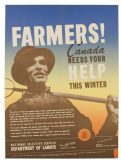The United Nations’ top official on global food security is preparing a damning report on Canada, condemning widespread food insecurity in one of the world’s most food-rich countries.
Olivier De Schutter, UN special rapporteur on the right to food, offered his preliminary findings at a May 16 Ottawa news conference after spending more than a week meeting with government officials, food security and local food advocates, food bank executives and First Nations leaders.
“Canada is a wealthy country with a strong record on human rights and yet one in 10 families in Canada is food insecure,” he said.
Read Also

Women who fed a nation
More than 40,000 young women supported the war effort between the 1940s and early 1950s, helping grow and harvest crops amid labour shortages. They were called Farmerettes.
The UN official said “Canada should face some tough questions in the context of its support for human rights” when he formally reports next year to the UN Human Rights Council.
While he conceded that the right to food security is not part of the Canadian Charter of Rights, it is a UN principle that Canada has embraced.
Canada is the first developed country to be subjected to an investigation since De Schutter was appointed the chief international “right to food” advocate four years ago.
He called his reports a mirror that countries can look into to see how well they are doing in providing food to their populations.
De Schutter, an advocate of local food and small-scale farmers serving local markets, said Canada is not doing well.
Canadian agriculture policy is too biased toward large farms and export markets.
Meanwhile, more than 800,000 Canadians use food banks every year, small farmers are being squeezed out while food availability and nutrition are major issues in aboriginal communities. Minimum wage and welfare policies do not provide poor Canadians enough money to ensure they have an adequate food supply, he said.
De Schutter said a major problem is that while there are local and provincial initiatives, there is no federal leadership.
He called for a national food policy that emphasizes local production, support for small farm operations and national food security.
“What is missing is federal leadership on this,” he said.
The Conservative government quickly dismissed De Schutter’s criticisms as ill informed.
Local food advocates embraced them as a serious and damning critique of Canada’s lack of attention to poverty, nutrition and food security.
“This shows the need for a national food strategy that emphasizes sustainable,” National Farmers Union youth vice-president Paul Slomp told an Ottawa news conference.
Diana Bronson, executive director of the lobby group Food Secure Canada, said it is a simple matter of food justice.
“We live in Canada,” she said. “Kids should not be going to school hungry. It’s as simple as that.”
New Democratic Party agriculture critic Malcolm Allen said it is a clear message that Canada needs a national food strategy that emphasizes food self-sufficiency.
He said Canadian agriculture has become adept at exporting food.
“We consider ourselves the food basket of the world ,but we can’t feed ourselves,” he told a news conference yesterday.














